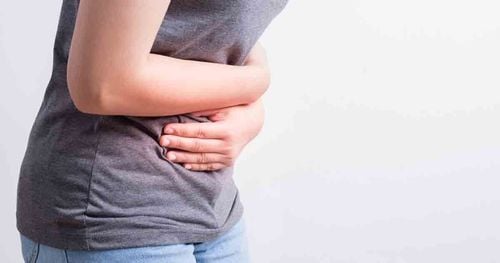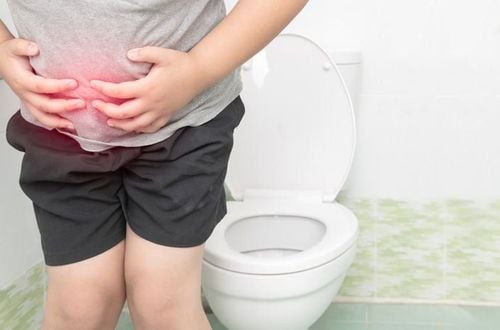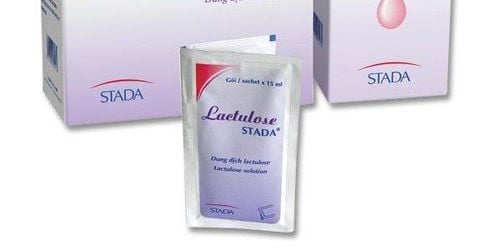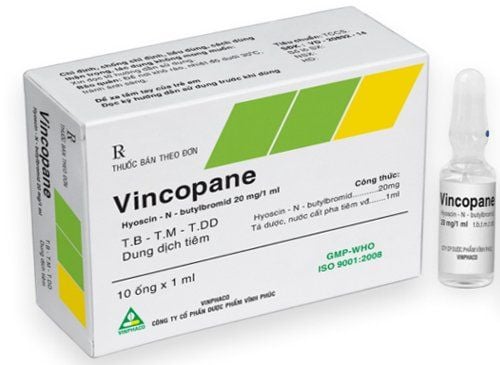This is an automatically translated article.
The elderly are subjects at risk of many different diseases. In particular, constipation is a very common problem in the elderly. Constipation in the elderly, if left untreated, can cause many serious health problems and significantly affect the quality of life of older adults. So what medicine should the elderly with constipation take?
1. Causes of constipation in the elderly
Constipation in the elderly is defined as no bowel movements for more than 3 days or less than 3 times a week, accompanied by symptoms such as abdominal cramps, solid or hard stools, and difficulty in defecation. In addition, constipation is also identified if the patient has bowel movements many times a day but does not pass stools accompanied by hard stools.
Constipation in the elderly is the most common digestive disorder, it is estimated that up to 50% of elderly people over 60 years old have problems with constipation. Causes of constipation in the elderly include:
Digestive system declines with age Just like other organs in the body, the digestive system also ages with age. This makes the intestinal motility decrease, causing food and stool to move slowly inside the intestine, when reaching the anus due to the absorption of water in the colon, the stool is often dry and difficult to excrete. This, in turn, causes constipation and makes it more common in the elderly.
Inappropriate nutrition This is a fairly common cause of constipation in the elderly. Many elderly people have the habit of eating less green vegetables, fresh fruits or abstaining from food excessively due to treatment for certain diseases. Or eating too little causes less waste and produces not enough stool to create a reflex to contract the colon, leading to constipation.
Eating a lot of products containing a lot of fat such as butter, milk, sugar, spicy food, hot... is also the cause of constipation.
Side effects of some medicines The elderly are at risk of many different diseases. The use of modern drugs such as antidepressants, drugs that cover the stomach lining, antibiotics ... will have the risk of experiencing side effects causing constipation.
Sedentary elderly people Regular exercise and exercise have the effect of increasing intestinal peristalsis, helping the digestive system work better. For the elderly, physical inactivity will increase the risk of constipation.
In addition, some people have medical conditions that cause them to lie down for a long time, which can make them constipated.
Habit of withholding defecation Some people do not develop appropriate defecation habits and have a habit of holding back defecation, which will make the stools dry and hard, affecting bowel movements.
2. How does constipation in the elderly affect the body?
Elderly people with constipation, if properly cared for and treated, usually only lasts a few days and will go away. However, if not treated, this condition will happen often and cause the following dangerous complications:
Stagnation of waste Feces can't get out, stagnation in the intestines will cause them to produce some toxins and when the body absorbs these substances will cause adverse effects on health. Older people become more irritable, have trouble sleeping, or feel depressed.
In addition, if stagnation of waste in a large amount will cause intestinal obstruction with manifestations such as abdominal pain, bloating, vomiting, bowel obstruction and inability to defecate. If this happens, you need emergency treatment.
Diseases of the anorectal region Hemorrhoids: Constipation causes the elderly to use a lot of force to push when going to the toilet. This is the cause of damage to the anal vein system, leading to inflammation and the formation of hemorrhoids.
Anal fissure: People with constipation often have hard dry stools and when defecating, they need to use force to expel them, causing an anal fissure (anal fissure). If not detected and taken care of in time, it will cause infection and serious complications of anal fistula.
Damage to blood vessels Using force to defecate when defecating can increase blood pressure, can increase blood pressure in the brain and cause cerebral blood vessel rupture. This is very dangerous, because the blood vessels in the elderly are often vulnerable.
3. What medicine do the elderly with constipation take?
In order to improve constipation, the elderly can apply measures to take medicine, diet, and activities. Using medicine, you can use preparations from western medicine or use traditional medicine.
3.1 Use of western medicine Constipation drugs for the elderly or for the object of spitting are divided into several subgroups. Depending on the mechanism of action of the drug, it is divided into different groups.
Bulk-forming laxatives This is a group of drugs that act locally to help the stool absorb water and soften it, making it easier to pass. The drug takes effect after 1-3 days of taking.
Some of these laxatives include: Citrucel, 500mg Methylcellulose tablets; Normacol...
Osmotic laxative group The main ingredients of this group of drugs contain sugar and inorganic salts, which have the effect of increasing water absorption and retaining water in the intestines, softening stools and stimulating defecation.
Some commonly used drug labels such as: Duphalac; Sorbitol Delalande; Forlax ...
Group of drugs used for enemas Contains mineral oil ingredients and is used in the form of syringes injected into the anus, thereby causing stimulation of intestinal motility and diluting stools to help expel stools quickly. quickly after a short time.
Stool softeners This group of drugs works by stimulating the excretion of water and electrolytes into the intestines. As a result, the stool is softened, thereby making it easier for the stool to pass. This medicine usually works quite slowly after a few days. Some commonly used types include Doxinate , Norgalax , Cholen HMB...
3.2 Traditional medicines to help with constipation Western medicines can sometimes cause some side effects such as bloating, abdominal cramps and pain. diarrhea while defecating. Therefore, some remedies for constipation from traditional medicine are often preferred. Here are some ways to treat constipation from traditional medicine:
Treatment of constipation from aloe vera or aloe vera Aloe vera is a medicine used in medicine to treat constipation. Aloe vera is also used externally to moisturize and soften burned skin.
How to use aloe vera to treat constipation: Take aloe leaves, wash, peel and take the gel inside. Then, cut the gel inside into small pieces and put it in a pot to boil with enough water until it boils. Then take the water to cool and then drink.
Black sesame Black sesame or devil is a medicine that has a laxative effect. Because of the oil in black sesame, it helps soften stools and laxatives. You can boil black sesame water and drink it or roast it and eat it directly.
Honey Honey has antibacterial effects, adding beneficial bacteria to help the digestive system work healthy and laxative.
How to relieve constipation with honey, the elderly can try 2 tablespoons of honey with warm water each time, drink 3 times a day. Note that people with diabetes should avoid this measure.
Herbal remedies or seeds are used to clear heat, brighten the face, lower blood pressure and laxatives.
How to use take about 500mg into the pot until it explodes, let it cool and then put it in a sealed jar to use it gradually. Each time from 6 to 8g of braking or boiling instead of tea daily, this medicine is very suitable for people with constipation due to hypertension.
Sweet potatoes Sweet potatoes contain fiber, vitamins of groups B, C and some nutrients such as lipids, glucid ... sweet potatoes not only help improve constipation but also good for health. The elderly can improve constipation by eating boiled sweet potatoes, fresh or dried sweet potato juice to drink.
3.3 Diet and living Besides needing to know what medicine the elderly with constipation should take, the living diet is also very important.
This helps relieve constipation and improve health, some things to keep in mind in the elderly diet include:
Diet: Elderly people should eat a lot of green vegetables in each meal to help supplement fiber, especially vegetables that have a positive effect on the colon such as spinach, sweet potato, water spinach, and amaranth. , jute vegetables, melon...; should add fruits such as oranges, tangerines, grapefruits, papayas, bananas, apples, pears...;Drink enough water, should drink at least 1.5 liters of water a day or the amount of water depending on the medical condition Currently, because water has the effect of softening stool, reducing friction in the digestive tract, helping to reduce pain when passing stools. The elderly should not eat hot spicy foods, containing a lot of fat; Limit alcohol, strong tea, coffee. Lifestyle: You should exercise gently every day depending on your health because it not only improves health but is also very good for digestion, helps increase bowel movements, and reduces symptoms of constipation. Elderly people need to create a habit of movement and avoid lying or sitting for a long time. Keep your mind at ease, avoid stress, anxiety, depression affecting health and digestive system. Should practice defecation habits: Should defecate in the correct position, fixed at one hour, preferably in the morning to improve constipation. Hopefully, through the article, you know what the elderly people with constipation take and what medications for constipation for the elderly. Changing your diet and lifestyle is always the first choice to treat and prevent constipation. Elderly people should follow a healthy lifestyle.
Please dial HOTLINE for more information or register for an appointment HERE. Download MyVinmec app to make appointments faster and to manage your bookings easily.













